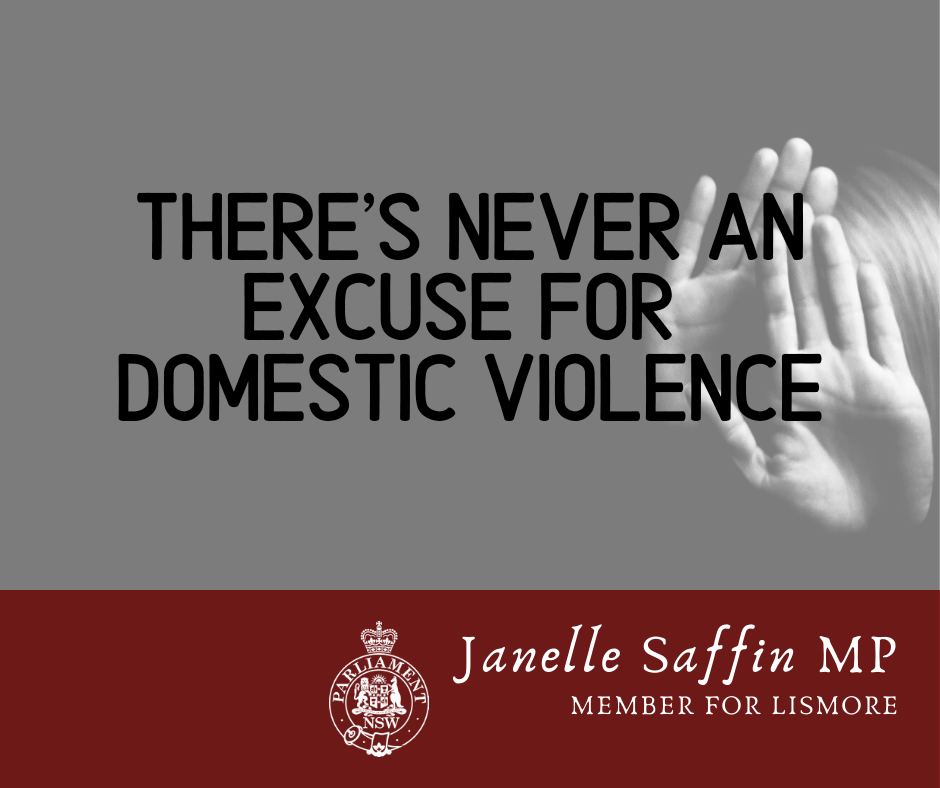NORTHERN Rivers and Northern Tablelands residents experiencing domestic violence can be assured police and frontline services are ready to support them and their families as New South Wales continues to respond to the coronavirus threat.
State Member for Lismore Janelle Saffin said any of her constituents experiencing domestic violence should not hesitate to seek help and support at this time.
“If you are in danger or in an emergency call Triple Zero (000),” Ms Saffin said.
“If you are in need of support services, such as housing or counselling, hard-working frontline services are also available to help those suffering domestic violence.
“I take this opportunity to thank all of the caring and compassionate people working in our frontline domestic violence services.”
Ms Saffin said there is an associated risk domestic and family violence will increase as the community is asked to comply with social distancing directions and self-isolation.
“No person should in live in fear of violence and I urge people to seek the help they need when it is safe to do so,” Ms Saffin said.
Ms Saffin added that perpetrators are on notice and that police have increased efforts to combat violence in the home, including more proactive operations to enforce protection orders.
“Police will continue to conduct thousands of Apprehended Domestic Violence Order (ADVO) compliance checks to keep victims safe,” Ms Saffin said.
NSW Police Force Domestic Violence Corporate Spokesperson, Assistant Commissioner Mark Jones, said police are monitoring rates of domestic violence.
“High-risk and repeat offenders are being targeted by specially trained police to ensure that all orders are strictly followed and complied with and offenders are arrested if violence is detected,” Assistant Commissioner Jones said.
“Police are also able to vary existing interim or final ADVOs if we know that violence is escalating, without needing to first go to court, so victims are immediately protected.
“NSW Police are working together with government agencies, including NSW Health, to ensure there is no increased health risk to the community in the current environment.”
The NSW Government is constantly adapting as the COVID-19 emergency evolves, which includes various justice, housing and policing responses to combat domestic violence.
In the Local Court, the Chief Magistrate has made the following changes:
- Increased use of audio visual link technology;
- Restricting physical attendance at court, where legally represented;
- Streamlining bail processes, localised to certain metro and regional local courts;
- Defended hearings where the accused is in custody, adjourned for eight weeks; and
- Police providing court dates of three months from issuing Field Court Attendance Notices.
Last week the Government also passed amendments in Parliament to enable Provisional ADVOs to remain in place for up to six months, if the court cannot consider them earlier. This coincides with reforms that extend the default duration of ADVOs made by a court from one year to two years.
Domestic violence survivors and their families are often at risk of homelessness. The State’s housing response includes the following additional government support:
- $14.3-million investment to increase the supply and flexibility of temporary accommodation across NSW, including accommodation suitable for self-isolation;
- $20-million commitment to accelerate pathways for existing clients and priority social housing applicants to secure stable housing in the private rental market – including more than 350 Rent Choice Start Safely packages dedicated to women and children escaping domestic and family violence; and
- Financial support covering the costs of additional staffing for homelessness providers, such as casual workers or overtime.
“Further changes may be necessary as the COVID-19 crisis continues, but in the meantime, victims of domestic violence should seek out the services available, when it’s safe to do so,” Ms Saffin said.
These include:
- 1800 RESPECT (1800 737 732) is a confidential information, counselling and support service;
- NSW Domestic Violence Line (1800 656 463) is a statewide telephone crisis counselling and referral service for women;
- Men’s Referral Service (1300 766 491) provide telephone counselling, information and referrals for men; and
- Link2Home (1800 152 152) can help refer women experiencing domestic violence to crisis accommodation.

